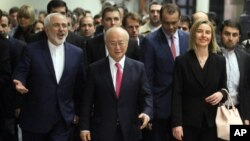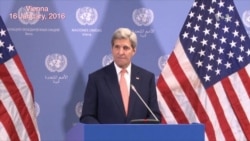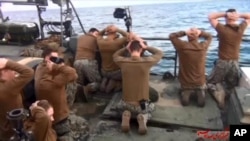The International Atomic Energy Agency on Saturday certified that Iran had met the provisions of the nuclear deal crafted by world powers, a move that cleared the way for Tehran to get relief from crippling international nuclear-related sanctions.
In a joint appearance in Vienna, European Union foreign policy representative Federica Mogherini and Iranian Foreign Minister Mohammad Javad Zarif announced the removal of the economic and financial penalties that have slowed Tehran’s economy.
Mogherini, reading a statement, said the "historic deal" was both "fair and strong" and that its "proper implementation" would be a "key contribution to regional and international peace."
Later, in an interview with VOA Persian, she said the negotiations that led to implementation “shows not only that diplomacy works but that it delivers.”
“I hope that this could open the way for different kinds of relations among the actors in the [Middle East] region,” she added.
In a separate appearance in Vienna, U.S. Secretary of State John Kerry said Saturday marked “the first day of a safer world.”
He added that continued verification of Iran’s compliance would remain the “backbone of the agreement.”
WATCH: Sec. Kerry on the implementation of the accord
The White House simultaneously issued an executive order putting U.S. measures for sanctions relief into place. However, U.S. sanctions against Iran for other issues, such as human rights abuses, remain in place.
Iranian President Hassan Rouhani says the Islamic republic has entered a "new chapter" in its history, in a speech Sunday praising the end of international sanctions.
Mixed reactions
But the historic moves were not hailed by all. In Israel, the most vocal opponent of the deal, Prime Minister Benjamin Netanyahu warned that "Iran has not relinquished its ambition to obtain nuclear weapons, and continues to act to destabilize the Middle East and spread terror throughout the world."
Many of U.S. President Barack Obama's Republican opponents, especially the party's 2016 presidential candidates blasted Saturday's announcement.
"That Iran deal is the dumbest deal I think I’ve ever seen," said presidential candidate Donald Trump at a recent campaign event.
Rouhani dismissed such criticism during his speech Sunday to the Iranian parliament. He said everyone is happy "except Zionists, warmongers fueling discord in the Islamic world, and hardliners in the U.S."
At the United Nations, Secretary-General Ban Ki-moon welcomed the achievement of reaching “Implementation Day,” calling it a "significant milestone that reflects the good faith effort by all parties."
US-Iran prisoner swap
Word of implementation came on the same day that Iran and the U.S. swapped prisoners. The five Americans freed included Washington Post correspondent Jason Rezaian and Amir Hekmati, a former U.S. Marine.
Kerry had been raising the status of detained Americans in all of his nuclear-related talks with Iran's Zarif.
He said while the two tracks of negotiations were not directly related, there was “no question” that the pace of progress in the talks to free the Americans “accelerated” because of “diplomatic channels unlocked” in the nuclear talks.
A senior administration official said the U.S. didn't want the citizens held by Iran to be used as leverage or bargaining chips in the nuclear talks, which might have jeopardized their release. The official agreed with Kerry that the deal had given the U.S. more opportunities to deal with the Americans being detained.
Conclusion of lengthy process
The implementation of the agreement, known as the Joint Comprehensive Plan of Action, was the culmination of nearly two years of intense negotiations.
Iran and the major world powers — the United States, the other permanent members of the U.N. Security Council, Germany and the European Union — reached agreement last July on the deal, in which Tehran pledged to scale back its uranium-enriching activities and submit to inspections, in exchange for a rollback of sanctions. Implementation of the agreement has proceeded during the ensuing six months.
In one of the final steps, Iran said Thursday that it had removed the core of its Arak heavy-water nuclear reactor and pumped cement into that portion of the reactor, meaning it could not be returned to service to produce a nuclear weapon.
World powers have voiced their suspicions for years that Iran was trying to build nuclear weapons, although Tehran said its nuclear program was intended for peaceful purposes.
In addition to the sanctions that shut down much of the West's trade with Iran, financial penalties imposed on the Islamic Republic "froze" or blocked at least $50 billion of the country's assets held abroad.
Tehran is also now free to expand trade with other countries.
Iranian President Rouhani had campaigned on a pledge to reform his country’s economy. Freedom from crippling sanctions has been a key component of his pledge.
TIMELINE: Iran Nuclear Negotiations
Impact in US
But the impact of Iran’s sanctions relief will be limited in the United States, said Kelsey Davenport, the director of nonproliferation policy at the Arms Control Association.
"A number of sanctions on human rights, on terrorism will remain in place that will make it very difficult for companies to navigate," she said.
WATCH: Limited US Trade With Iran Now Possible
In a Friday briefing, an administration official said the biggest impact for U.S. businesses would be in three categories.
The official said one category involved food and other products, such as importing pistachios from Iran as well as Iranian carpets.
The second category would be more freedom for Iran to purchase civilian aviation equipment from the United States.
Third, the official said, foreign subsidiaries of U.S. companies will have more freedom to engage with Iran, as long as they abide by other U.S. government requirements.
Countries that have engaged in extensive trade with Iran in the past are likely to see the most benefits from Iran’s sanctions relief, said Atlantic Council Iran initiative director Barbara Slavin, who spoke via Skype.
These are "Asian countries, where Iran already has a lot of assets in their banks, money that has been frozen, oil revenues that have been frozen," said Slavin.
She also said some European countries and Russia could benefit.
"The Russians will try to sell Iran some more nuclear power plants," Slavin added.
Flashpoints remain
Although implementation will open the door to some trade between the U.S. and Iran, it will not result in the U.S. overlooking other areas of concern about Tehran, said State Department spokesman Mark Toner.
"None of us have rose-colored glasses on," said Toner. "None of us believe that suddenly once we reach Implementation Day that a whole new world is going to open up and we are suddenly going to cooperate with Iran."
Those areas of concern include Iran’s recent ballistic missile tests and its firing of rockets near a U.S. military ship in December.
On Saturday, Democratic presidential candidate Hillary Clinton and U.S. Senator Richard Blumenthal, a Democrat from Connecticut, called for sanctions on Iran over its ballistic missile program.
There are also U.S. concerns about Iran’s treatment of 10 U.S. sailors who were briefly detained after they entered Iranian waters.
Iran’s release of a video showing the detained sailors with their hands over their heads drew U.S. criticism from politicians, including Republican presidential candidates, many of whom cited the incident in a GOP presidential debate Thursday.
Deal still opposed
The deal was widely panned by Republicans and some Democrats, and the agreement has been brought up repeatedly on the campaign trail.
Some U.S. presidential candidates have vowed to undo U.S. participation in the agreement, if elected — a move that Davenport said could prove to be difficult, if the first year of compliance goes well.
"If there are no violations and the deal is seen to be working — to be preventing Iran from moving toward a nuclear weapon — then I think it will be much more difficult for a president to justify moving out of the deal," she said.
There is also concern about the deal on Capitol Hill. The U.S. House of Representatives voted on a measure Wednesday that would have prevented President Barack Obama from lifting some Iran-related sanctions. However, lawmakers then revoked their vote and scheduled another vote on the provision in late January.
Any U.S. move to unilaterally undercut the agreement would be viewed poorly by the other world powers involved in the agreement, said Davenport.
"If the U.S. sabotaged the deal unilaterally, I think we would be out on a limb by ourselves," she said.
Compliance monitoring
A senior administration official said that since October 18, Iran had shipped about 25,000 pounds of enriched nuclear material to Russia, reducing its nuclear stockpile by 98 percent and reducing its number of centrifuges by two-thirds. Those steps and others have reduced Iran's "breakout time" for developing a nuclear weapon from two months to about a year, according to the official.
The official also said Iran had agreed to "unprecedented monitoring" of its nuclear program for years to come.
Slavin said Tehran’s compliance, in the long run, would depend on its "threat perceptions."
"It will depend on whether there is proliferation around them, whether the Saudis try to get nuclear weapons," she said.
VOA's Mary Alice Salinas contributed to this report.








